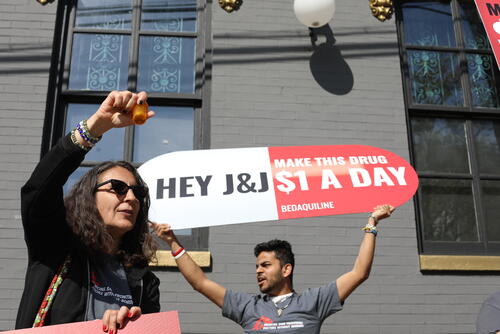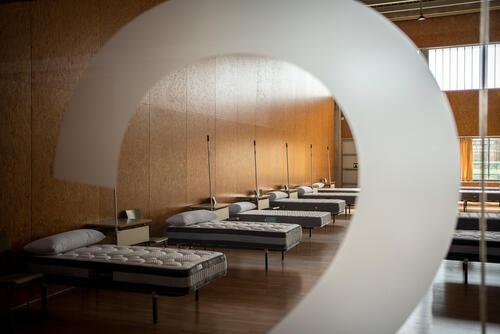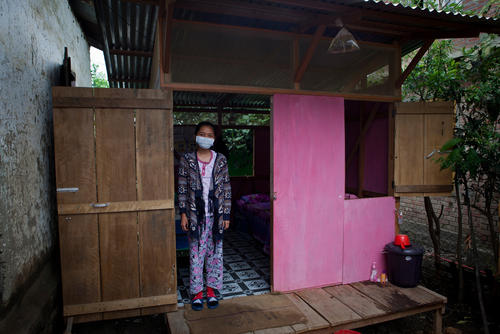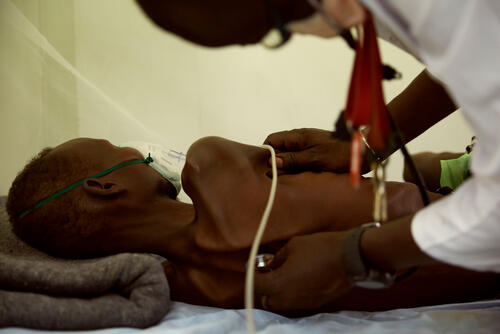- Pharma company Johnson and Johnson (J&J) sell TB drug bedaquiline for nearly US$1,200 per treatment course, a price that is out of reach for many who need it.
- We are demanding J&J to reduce the price of bedaquiline to $1 per day – half what they are currently charging – to scale up treatment and save lives.
- People are protesting outside J&J offices in a number of cities around the world, to pressure the company to lower the price.
Geneva - Médecins Sans Frontières (MSF) has launched a global campaign calling on pharmaceutical corporation Johnson & Johnson (J&J) to lower the price of its anti-tuberculosis medicine bedaquiline to no more than US$1 per day for people everywhere who need it, in order to allow scale-up of drug-resistant tuberculosis (DR-TB) treatment and reduce deaths.
We are demanding this price cut considering the joint contributions made in the development of this drug, including our own contribution. MSF was joined by TB activists and civil society in protests outside of J&J offices in the US, South Africa, Brazil, Belgium, Ukraine and Spain demanding the corporation make the drug available for people with DR-TB for no more than ‘a dollar a day’.
$1,200
1,2
$600
6
“Bedaquiline was developed using taxpayer money and contributions from the global TB community,” said Sharonann Lynch, HIV & TB Policy Advisor for MSF’s Access Campaign. “Those who contributed to bedaquiline’s development should have a say in how the drug is priced. We’re calling on J&J to price bedaquiline at no more than $1 per day so that it can be made available to all people with drug-resistant TB. We will not back down until the price of bedaquiline is brought down”.
J&J profiting off the contribution of others
Bedaquiline was developed with considerable taxpayer, non-profit and philanthropic support. Much of the critical work to inform the use of the drug and demonstrate its therapeutic value was conducted by the TB research community, health ministries, and treatment providers including MSF, and was financed by taxpayers and other donors.
Despite this joint research and development effort by the global TB community, J&J alone owns the patent on the drug in many countries and has sole rights to determine in which countries the drug will be sold. Moreover, J&J also benefited from a significant financial windfall as it obtained a Priority Review VoucherUnder the neglected disease priority review voucher (PRV) programme, when the US Food and Drug Administration approves an eligible neglected disease product—a medicine or vaccine—the developer is awarded a PRV. This voucher can then be used to accelerate the FDA review of any of the developer’s drugs or vaccines. Alternatively, the developer can choose to sell their voucher to another entity, as has been done previously for as much as US$350 million. from the US Food and Drug Administration (USFDA), that can be used to get accelerated marketing approval for another of its drugs.
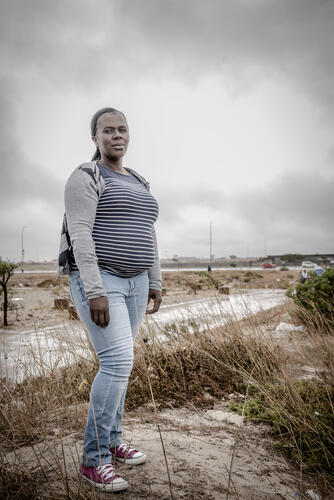
J&J must halve the price – and they’d still make a profit
J&J currently charges double the price that MSF is asking: J&J has priced bedaquiline at $400 for a six-month treatment course for countries eligible to buy the drug through the Global Drug Facility (GDF), a TB drug and diagnostic procurement mechanism, operating out of a UN agency.
However, researchers from the University of Liverpool have calculated that bedaquiline could be produced and sold at a profit for much less – as little as 25 cents per day if at least 108,000 treatment courses were sold per year. At $1 per day, the price of bedaquiline would be $600 per person for the 20 months of treatment that many DR-TB patients require.
In comparison, the lowest price J&J charges today for 20 months of bedaquiline is nearly $1,200 ($2 per day) in countries eligible to purchase through the GDF, while J&J charges other countries much more. This high price affects the scale-up of the drug in many countries struggling with DR-TB epidemics, considering that bedaquiline is just one of multiple drugs required in treatment regimens.

Lifesaving drug that simplifies treatment
“Bedaquiline saved my life. I was experiencing a lot of side effects during my previous treatment which included drugs that need to be injected,” said Noludwe Mabandlela, who was treated for multidrug-resistant tuberculosis (MDR-TB) in Khayelitsha, South Africa and was cured in early 2019. “After switching to bedaquiline, my health improved much faster. I wouldn't wish anyone to go through what I experienced. Pharmaceutical corporations like J&J should stop inflating the price of the drug that offers a lifeline to people affected with drug-resistant forms of tuberculosis.”
Bedaquiline is one of only three new TB drugs to be developed in over half a century (the others are delamanid and pretomanid). The previously recommended DR-TB treatment regimens used by most countries required people to take as many as 20 pills a day for up to two years and endure painful daily injections and severe side effects ranging from psychosis and persistent nausea to deafness.
These suboptimal treatments managed to cure only 55 per cent of people with multidrug-resistant tuberculosis (MDR-TB) and just 34 per cent of people with extensively drug-resistant tuberculosis (XDR-TB).
Now, bedaquiline is proving to be a gamechanger… We need this drug to be affordable for everyone who needs it, everywhere.Pilar Ustero, medical adviser, MSF Access Campaign
Based on data generated by the TB community showing improved treatment outcomes in people who received bedaquiline, the World Health Organization in 2018 recommended bedaquiline be used as a core part of an all-oral treatment regimen, replacing the injected drugs.
Patients greatly benefit – if they get access
Increased use of bedaquiline has already shown benefits, even among people more likely to have poorer treatment outcomes, including people living with HIV, and people with pre-XDR-TB and XDR-TB. For example: in Belarus, among 244 people who were treated with bedaquiline – 96 per cent of whom had either pre-XDR-TB or XDR-TB – the treatment success rate increased to 87 per cent.
“We have seen so many patients go deaf, lose their jobs or lose their lives because they had no option other than the excruciating TB drugs that had to be injected,” said Pilar Ustero, medical adviser for MSF’s Access Campaign. “Now, bedaquiline is proving to be a gamechanger, giving those people with DR-TB who can access it a better chance to be cured, without the toxic side effects. We need this drug to be affordable for everyone who needs it, everywhere.”
Since WHO recommended the use of bedaquiline – a year ago – as a core drug for the treatment of MDR-TB, less than 12,000 people were treated with a regimen including bedaquiline according to national TB programmes. This is a paltry figure considering that an estimated 80 per cent of the 558,000 people who develop DR-TB annuallyWHO Global Tuberculosis report, 2018 - https://www.who.int/tb/publications/global_report/en/ should be treated with this drug. Rapid rollout of better-tolerated treatment containing bedaquiline will happen only if J&J makes it widely available in an affordable way, including by allowing other TB drug manufacturers to make generic versions.
MSF is the largest non-governmental provider of TB treatment worldwide and has been involved in TB care for 30 years, often working alongside national health authorities to treat people in a wide variety of settings, including chronic conflict zones, urban slums, prisons, refugee camps, and rural areas. As of September 2018, across MSF projects in 14 countries, more than 2,000 people have been treated with the newer drugs, including 633 with delamanid—the only other new TB drug developed in more than 40 years—1,530 with bedaquiline, and 227 with a combination of both medicines.
MSF is also working to overcome patent barriers to this drug and to ensure the entry of multiple producers as a more long-term solution for access to affordable bedaquiline. In February 2019, MSF supported a patent challenge filed by two DR-TB survivors against J&J’s patent application in India. MSF is also urging the Indian government to override the patent and encourage its TB drug manufacturers to supply bedaquiline to its TB programme by issuing a ‘compulsory license’, considering that DR-TB is a public health emergency. This can be an effective way of eventually overcoming patent barriers to access critical health products, and other countries could follow suit and use the high price as grounds to also issue compulsory licenses.



